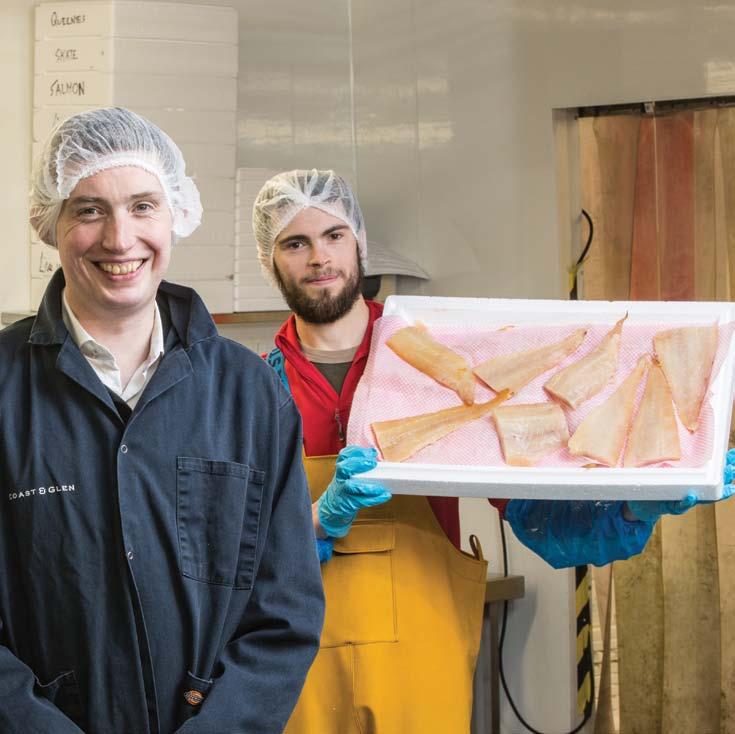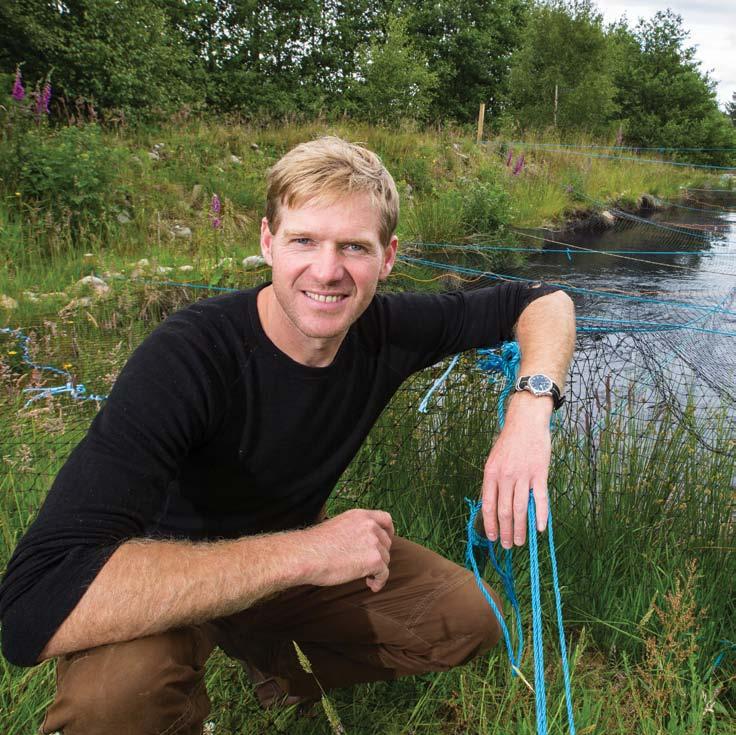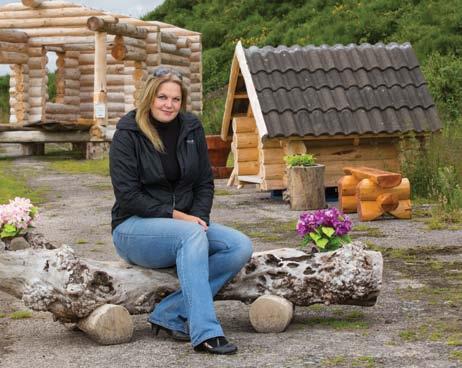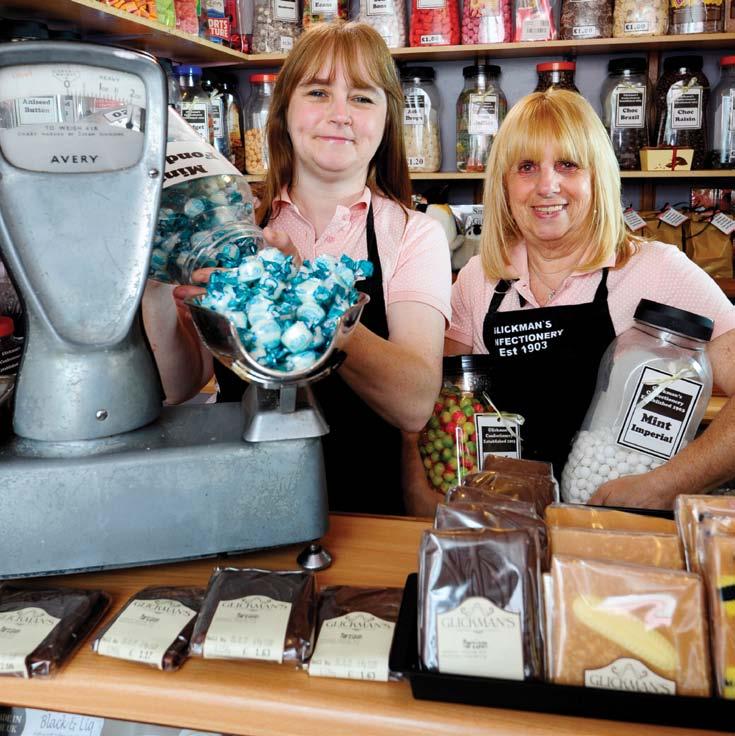Resilient e conomies, Resilient c ommunities
FSB ManiFeSto
Scottish Parliament Elections 2016






98% of Scottish businesses are small 55% of private sector jobs are sustained by SMEs
1million people are employed by Scottish SMEs
introduction
c hapte R 1
A new deal for small businesses
c hapte R 2
Resilient economies, resilient communities
c hapte R 3
inclusive growth
the Federation of Small Businesses (FSB) is Scotland’s largest direct-member business organisation representing around 19,000 members north of the border. the FSB campaigns for a resilient economy which allows small businesses across Scotland to grow and prosper.
Scotti S h Parliament e lection S 2016 FSB in Scotland m ani F e S to r e S ilient e conomie S r e S ilient communitie S contents
p3
p5
p11
p19
1
Contents
Coast and Glen, Inverness
Delfour Hatchery, Inverness-shire

i nt R oduction
Scotland stands at a crossroads. GDP and employment have broadly returned to pre-recession levels, but business confidence is still fragile and too many of the old problems remain. this time, if we want to make the recovery stick, we cannot repeat the mistakes of the past. We need to look beyond the traditional approaches to economic success and instead understand what really makes a healthy economy that delivers for people, businesses and communities.
We can’t buck the global economy, but we can re-position ourselves to become more resilient.
introdu C tion
While small businesses are routinely referred to as the lifeblood of the economy, the intricate role they play – individually and collectively – in their communities is often underplayed in economic strategy. And yet, they are where innovation is born and nurtured; where entrepreneurship, creativity, social mobility and social responsibility take hold.
Perhaps due to Scotland’s economic past, together with the obvious benefits of scale, economic policymakers are still drawn to the big industries that attract global investment. And big-ticket investment is important. However, a more inclusive and resilient economy needs a more nuanced economic approach; one which recognises the importance of successful local economies and the role of small businesses, who are living, investing and rooted there.
Scotti S h Parliament e lection S 2016 FSB in Scotland m ani F e S to r e S ilient e conomie S r e S ilient communitie S
2 3
Chapter one
a new deal for small businesses

a new deal fo R small business es
Scotland is often thought of as a country dominated by small businesses. indeed, their numbers have rocketed since devolution, up by almost 100,000 between 2000 and 2014. During the same period, the number of medium-sized and large businesses remained virtually unchanged.
Scotland’s economic strategy has focused on finding the winners who will make the greatest impact on Scotland’s bottom line. And the current approach does recognise the role that small businesses play in providing the pool from which the next generation of high-impact companies will emerge. But their wider contribution, their fundamental role in the economy, is often misunderstood or underrated. Almost a million people in Scotland now either work for themselves or are employed in a small business, many of them based in the home. But much of our policymaking and delivery still fails to understand and respond to this new economic reality.
The next Scottish Government needs to get the right policy balance –understanding when deeper, more effective government action is required and mindful of when it is ineffective or getting in the way. Some of this may require legislation, but more often we need regulatory, behavioural and culture shifts in government’s approach to small business.
Scotti S h Parliament e lection S 2016 FSB in Scotland m ani F e S to r e S ilient e conomie S r e S ilient communitie S
4 5
LiGo, Glasgow
On regulati O n
traditional approaches to government regulation are being tested by the fast pace of change in markets and technology; the preponderance of very small businesses; and a squeeze on resources for regulators.
this leads to inconsistent application of regulations, where some businesses are regulated and others aren’t. at the same time, the sheer volume of regulatory change means that even the most conscientious small business owner struggles to keep on top of their responsibilities. If we want effective regulation in Scotland, we need a different, more sophisticated approach. We need to target regulation more selectively, perhaps by excluding micro businesses where appropriate, as well as acknowledging that the state now needs to take some responsibility for advising very small enterprises about regulations they want them to follow.
• The next government should consider how innovation can be encouraged while ensuring all businesses in a certain sector compete on a level regulatory playing field. Our approach should be reviewed to ensure that new entrants – international controversy has focused on Airbnb and Uber – do not sidestep rules that traditional operators have to follow.
• The Civic Government (Scotland) Act 1982, which regulates a wide range of business activity, has become unwieldy and outdated and, as recently recommended by Holyrood’s Local Government Committee, should be reviewed.
• Small businesses in the hospitality and retail sectors have faced a range of regulatory changes in recent years. Some of these have been better designed and implemented than others, but they have all resulted in increased costs and bureaucracy. More widely, small employers face significant cost increases associated with changes

23%
of Scottish firms say that regulation is a barrier to growth
64% of businesses think that the current economic approach favours large multi-national companies
a new DeaL for smaLL busInesses
to wage levels and pension auto-enrolment. Any new regulatory requirements for business should therefore reflect this reality and be tightly targeted and proportionate – exempting the smallest businesses where possible.
• Following the example of the Scottish Government finance hub, there should also be a regulation hub on mygov.scot, aggregating regulatory advice. In time, businesses should be able to receive tailored advice, relevant to their sector and location, and should be able to do all of their transactions with the public sector online.
On e-g O vernment
Rapid technological change will not only transform our economy, it will also affect how governments across the world engage with and inform their citizens. E-government offers Scotland an opportunity to consider how the state reaches and interacts with businesses in a more effective and efficient manner. Instead of seizing the opportunities offered by our relatively small scale, Scotland has made poor progress towards developing e-services for business. Well-intentioned ideas to support small businesses currently fail because of poor delivery, mainly because too many organisations are competing for the attention of busy business owners. We need tailored, on-demand information for businesses.
• The next government should revolutionise how the Scottish public sector interacts with business online. It should seize the mygov.scot framework to deliver urgently a single, consistent platform for all transactions and public sector communications, from all agencies and every layer of government. In the interim, there should be a moratorium on any new publicly funded business-facing websites.
• Within the first year, the next Scottish Government should bring all parts of the Scottish business rates system – from assessment, payment, to appeals – onto the mygov.scot system.
Scotti S h Parliament e lection S 2016 FSB in Scotland m ani F e S to r e S ilient e conomie S r e S ilient communitie S CHapter 1
6 7
robbie fluid engineering, bathgate
• The next government should introduce a Digital Services Bill. This would place a duty on all public bodies in Scotland to commit to, and co-operate with, the digital government and services agenda, as well as amending existing legislation to remove legal barriers to delivering more services online (for example, requirements for physical signatures on application forms). The Bill would also introduce a digital impact test to accompany all primary legislation, requiring early consideration of digital opportunities, requirements and obstacles the legislation may present or demand.
o n suppo R t fo R business
once established, relatively few small businesses access business support or advice, whether privately or publicly funded. a broad system of government-funded business support is available in Scotland, but it suffers from being unresponsive to changes in the economy, as well as a chronic inability to provide a seamless service across different parts of the public sector. Successive reviews of business support in Scotland have highlighted the need for a nationally driven service to provide consistent quality, combined with local flexibility. However, finding the correct delivery mechanism for this approach has proved difficult, with no single individual or body in overall charge and providing leadership. These difficulties are likely to be exacerbated as more new entrants seek to plug perceived gaps in the market, making the landscape even more diverse.
• Links between Business Gateway and other parts of the public sector should be strengthened to make it easier to use Business Gateway as a route to reach businesses.
• More work is required to streamline business access to council services via Business Gateway.

• Business support websites, such as those of Business Gateway, Skills Development Scotland or Scottish Enterprise, should be incorporated into mygov.scot.
• To tackle duplication, reduce costs and competition for firms’ time, the number of public sector initiatives seeking to change behaviour or promote a particular government policy should be reduced.
• Advice and support on newer key business topics – from energy efficiency to cyber resilience – should be integrated within existing business support services.
With new fiscal responsibilities being assumed by the Scottish Parliament, the already wide remit of the Cabinet Secretary for Finance will increase further. Thus, the time is now right for the new Scottish Government to separate the Cabinet Secretary positions for managing the country’s finances and growing the economy by appointing a Cabinet Secretary for Business.
o n business finance
While credit conditions have been easing somewhat since 2013, a number of gaps in the business finance market are still apparent –particularly around micro finance. Previous government schemes have been tightly targeted at specific types of business who were deemed a priority by government.
• Government support, such as the new £40 million fund to provide investment to small businesses, unveiled in September’s Programme for Government, should focus on providing debt finance for the wider small business community.
• When a bank’s decision to close its branch in a town or village would leave that place without any banking facilities, the government should support its agencies, the local authority or other parts of the public sector to explore whether any local publicly owned facilities could host bank counter services.
Scotti S h Parliament e lection S 2016 FSB in Scotland m ani F e S to r e S ilient e conomie S r e S ilient communitie S CHapter 1
8 9 a new DeaL for smaLL busInesses
Cornelius wines and beers, edinburgh
A third of companies report that credit is unaffordable
The FSB believes that there should be a Scottish Government Cabinet Secretary for Business

Chapter two
resilient e C onomies, resilient C ommunities
4
Resilient economies, R esilient communities
Scotland’s economy is amongst the strongest in the UK, with the highest output per head, behind London and the South east. Yet comparative success at a macro level has not brought success to many communities across the country.
We know that a small number of firms have a disproportionate impact on the economy and that Scotland plc needs more of our companies to improve productivity, internationalise and innovate. However, even if the current economic strategy succeeds in achieving this (where so many others have failed), our past shows us that a rising tide does not lift all boats. Making progress on key growth indicators won’t be enough to deliver the well-functioning, healthy places that a robust economy requires.
To make our local economies more resilient, we need a better understanding of the right economic strategy for different communities. And that means using the creativity and flexibility of Scotland’s 479 towns and cities. It means maximising the potential of the small businesses that service local demand, create wealth, sustain jobs, develop careers and invest in new ideas and products.
The Scottish Government’s current economic strategy at least acknowledges, in a way that previous strategies did not, the economic contribution of local sectors and regional cohesion. However, the next government must go much further, using emerging data and policy on successful places as the foundation of its economic strategy.
Scotti S h Parliament e lection S 2016 FSB in Scotland m ani F e S to r e S ilient e conomie S r e S ilient communitie S
10 11
to cost the local economy £1.67+ of
local
performing
45%
in 5 private sector jobs in rural areas are with SMEs Every £1 cut in local roads budgets is estimated
small businesses think their
economy is
poorly
Half of all Scottish businesses are home based
2
mitchells Dairy, Inverurie CHapter
o n places
the recession has left its mark on towns and their businesses. Many continue to face a perfect storm of tough trading conditions, rising operating costs, cut-throat competition from online, large out-of-town developments and tired commercial environments. However, the regeneration of our towns has to move away from a narrow focus on the high street and focus instead on the wider resilience of the place.
• Decision-making and budgeting should be devolved to town-level, allowing outdated infrastructure to be addressed.
• Resources and expertise could then be targeted on struggling towns by establishing local expert teams, with place-based budgets, to find creative solutions to the economic problems facing their areas.
• The evidence base available through the ‘Understanding Scottish Places’ tool should be expanded to include more economic indicators, such as business start up rates, thus creating reliable and comparable data on the economic performance of towns.
• All future city deal proposals should include opportunities for local businesses to contribute at an early stage.
• Following successful work in Manchester, local government should be encouraged to release funds from their pension schemes for local infrastructure investment.
across our communities, we need to create the conditions for a more competitive and innovative trading environment – ensuring that wellintentioned policies and regulations do not get in the way.
• Business Improvement Districts (BIDs) are enhancing many Scottish communities. Now is the time to review their success; with a view

Superfast broadband availability in Scotland is the worst amongst UK nations
14,000 premises in Scotland are in areas without 2G coverage
resILIent eConomIes; resILIent CommunItIes
to tweak the model to maximise support from smaller firms and improve transparency. During the next term, Super-BIDS (with additional responsibilities and powers) should also be piloted.
• Barriers to Scotland’s growing pop-up and mobile economy should be reduced, with public sector bodies being actively encouraged to bring their vacant properties and derelict / underused land back to life through these enterprises.
• The Town Centre First Principle – designed to encourage the public sector to invest in town centres rather than on the outskirts –should be properly enforced. The Scottish Government should also explore how financial penalties could be used to deter public sector organisations like the Scottish Courts Service and Police Scotland from undermining regeneration efforts by rationalising their estate and pulling out of towns. All government departments and public bodies should be reminded of the principle in funding agreements with the Scottish Government.
On ec O n O mic devel O pment
An effective indicator to measure resilience should be established and included in Scotland’s national Performance Framework.
Many organisations have a role to play in local economic development, but the core functions and responsibilities currently allocated to local government should be placed on a statutory footing.
Scotti S h Parliament e lection S 2016 FSB in Scotland m ani F e S to r e S ilient e conomie S r e S ilient communitie S CHapter 2
12 13
Traffic Design,Glasgow

o u R inf R ast R uctu R e
While many businesses trade globally, many more depend on local and regional trade. While there is always a long list of scheduled national transport projects, sustained investment in local road infrastructure is long overdue. tackling the backlog of repairs needs to become a priority in the national transport strategy and additional resources should be allocated. Poor digital and mobile connectivity is a major barrier to growth for businesses across the country. this puts Scotland’s businesses at a competitive disadvantage to counterparts in the rest of the UK. A lack of reliable, affordable broadband is a missed opportunity for Scotland as it prevents more people from living, working and setting up businesses in our beautiful, but remote, places.
• Broadband should be considered the fourth utility – all businesses should receive a basic level of service of 10Mbps by 2018-19, regardless of location.
• Beyond the current investment programme, ongoing public sector leadership will be required. The Scottish Government should provide a list of infrastructure work necessary to bring universal next generation access with estimated costs.
• Third party bodies (such as local government, community and business groups) should be allowed to fund digital infrastructure and tap central government expertise. The Scottish Government should co-ordinate private and public activities to close the connectivity gap, detailing digital infrastructure investment at each budget.
• Local community funds – such as those established to compensate communities next to large developments like windfarms – should be encouraged to invest in local digital infrastructure with the help of Community Broadband Scotland.
Scotti S h Parliament e lection S 2016 FSB in Scotland m ani F e S to r e S ilient e conomie S r e S ilient communitie S
resILIent eConomIes; resILIent CommunItIes
14 15
Limetree Consultancy, aberdeen
• The Scottish Government should consider how public sector assets – such as public buildings – could be better used to support improved mobile coverage. A separate Scottish agreement with mobile operators should be considered, with appropriate support from the Scotland Office and Ofcom.
• The Scottish Government should set up an innovation fund to improve Scotland’s mobile coverage via the enhanced fibre network.
o n local tax and democ R acy the non-domestic rates system, based on a notional value of Scotland’s commercial premises, is in need of radical reform. We need a system that is simpler for businesses to understand and navigate, doesn’t discourage investment or improvement and doesn’t unfairly offer advantage one part of the economy over another. the Scottish Government should commission an independent analysis of options for reforming local business taxation in Scotland. if it opts to retain the current system of non-domestic rates, then improvements are required.
• The rates burden for start-up and small businesses should be removed permanently, by taking all low-value premises out of the system, or placing small business rates relief on a statutory basis, or introducing some form of rates “tax allowance” for all businesses.
• The disincentive to invest in premises should be removed by delaying post-improvement revaluations for two years.
• The government should move to a system of more frequent revaluations.

3in5 firms do not understand how their premises’ rates bills are calculated
There may well be a case for more local power to be accompanied by more local fiscal control, but as yet – and particularly when local authorities are desperate for additional income – small businesses are not convinced that this power would be used wisely.
On the envir O nment
energy, waste and water charges have become a challenge for many businesses, but the availability and price of services will vary by area.
• The next Scottish Government should review the opportunities offered by micro-renewable energy to small businesses and considering how small firms could sell small amounts of energy back to their community.
• A post-implementation review of the 2012 waste regulations should be carried out, in particular to ascertain whether the waste market is working for small businesses.
• Until such a review is complete, no new waste obligations should be placed upon small businesses.
• Targeted advice and finance should be made available to Scotland’s tourism accommodation providers to help them address the particular energy efficiency challenges they face.
• The water industry should be required to fund an awareness campaign for businesses around the non-domestic water market and their ability to switch suppliers.
55% of tourism businesses think energy costs are a barrier to success
Scotti S h Parliament e lection S 2016 FSB in Scotland m ani F e S to r e S ilient e conomie S r e S ilient communitie S CHapter 2
resILIent eConomIes; resILIent CommunItIes
16 17
wild furniture, Dulnain bridge
Chapter three
i n C lusive growth

9 in 10 long term unemployed who find private sector work, do so in an SME or become self employed 40% increase in the number of small businesses and self-employed between 2000 and 2014
i nclusive gr O wth
over the course of the long journey back from the 2008 crash, the debate on economic growth has changed. Politicians on all sides have more clearly linked wealth creation with reducing inequalities. While not all businesses will agree with this approach, most small businesses would acknowledge that they aren’t immune from the economic conditions affecting their community. But the connections between local businesses and society run deeper than a simple bargain in which businesses need communities to provide a workforce, infrastructure and public services, while the public sector needs businesses to create employment, generate revenues and provide services.
Rather, a healthy local economy balances the needs of business, society and the public sector, recognising that no one part operates in isolation from the other. Small businesses have a contribution to make towards creating a fairer, more equal society. But in return they expect a fair deal too. They need to know that their hard work will not be undone by promoting one part of the economy over another, or by badly designed regulation. The value they offer as local suppliers and employers must be recognised. And they need to be treated fairly as consumers.
38 % of firms say skills shortages are a barrier to growth
Scotti S h Parliament e lection S 2016 FSB in Scotland m ani F e S to r e S ilient e conomie S r e S ilient communitie S
18 19
Saltire Roofing Edinburgh
On j O bs and training
Small businesses employ almost one million people in Scotland and are a driving force for job creation. They are less likely to offer insecure forms of employment such as zero-hours contracts and offer higher levels of job satisfaction. But today’s Scottish labour market presents a number of challenges to small firms – from the devolution of employment support services, to technological change in important sectors, to political concerns over job quality and wage levels. Skills shortages also remain a persistent problem, with the number of small businesses reporting that a lack of suitably trained staff are holding back their business growth plans at historically high levels.
• The new employability support powers that come to Scotland in 2017 should be used to simplify and standardise employment support across the country. Any employer who is keen to take on someone who is long-term unemployed should only have to deal with a single point of public-sector contact.
• A national employer recruitment incentive, that gives small firms the flexibility to use the fund according to their needs, should be continued for the next parliamentary term.
• The Scottish Government should recognise that apprenticeships will not be the appropriate training model for many employers and should ensure resources are also available for work-based, bitesized training.
• The industry-led model that created the Digital Skills Academy –dubbed CodeClan – should be established in other sectors with acute skills shortages.

o n schools
employers are happy to play their part and help train young workers, but they are entitled to expect the school system to provide suitable candidates with the basic skills and a willingness to learn.
• We need to better equip young people for the workplace of today and tomorrow by aiming to be in the top performing cohort of OECD countries for literacy and numeracy by 2025.
• Schools should be rigorously inspected and reviewed to ensure pupils are work-ready and have high quality soft and digital skills.
• Regional Developing Young Workforce groups should ensure that school pupils benefit from the real-world experience of local, small firms through a substantial increase in activities such as work experience, class talks and careers advice.
• A study into the economic impact on Scotland of the education attainment gap should be commissioned.
Scotti S h Parliament e lection S 2016 FSB in Scotland m ani F e S to r e S ilient e conomie S r e S ilient communitie S
21 Chapter 3 in C lusive growth 1
The
in 4 small businesses have been involved with a local school or college in the last 2 years
average small business has 10 employees
20
the royal mcGregor, edinburgh
o n public cont R acts
Public spending is often expected to contribute to a range of different desirable outcomes, from better employment conditions to more growth opportunities for Scotland’s businesses. However, the wider economic benefits that flow from public contracts – such as maintaining a local business base in more economically disadvantaged areas – are often undervalued. if the desire to achieve particular standards from our public contracts risks excluding small firms, it therefore risks losing these economic benefits.
• All public bodies should publish detailed information about how they spend public money in annual procurement reports.
• Money spent with small, local firms delivers more for local economies than spending with large firms. Therefore every Scottish public body should aim to spend ten per cent of its procurement budget with firms with fewer than 10 employees by 2021 – bringing at least an additional £250million of spend per year to the smallest businesses.
• Delivering higher levels of pay for those working on public sector contracts must be matched by a commitment from the public sector to pay more for those services.
• To measure whether it is achieving more with public spending, the next government should improve the data it gathers on procurement. For example, it should be able to profile the location, ownership and status of suppliers.
• The Scottish Government should establish a Procurement Ombudsman to provide an accessible and affordable way for small firms to resolve disputes about the awarding of contracts.

63p additional benefit for local economy for every £1 spent with smaller local businesses
£7.6bn
boost to economy if number of women-led businesses matched the number led by men
• Through the increased use of project bank accounts, open book accounting and random audits, public sector buyers should be obliged to ensure that their prime contractors pay sub-contractors on time, taking remedial action where necessary.
• Public Contracts Scotland should increasingly be used as a route to advertise sub-contacting opportunities for public contracts.
on entRepReneuRship
attitudes to business are changing and self employment is likely to feature in the career of increasing numbers of Scots. More business owners will balance running a business with other commitments and will move in and out of employment during their careers. With our business birth rate still lagging behind the UK, we need to encourage more, not less, of this entrepreneurial activity. But if businesses are to play a part in creating a fairer Scotland, then those who choose selfemployment should also expect a fair deal.
• The next Scottish Government should not only continue to support the Women’s Enterprise Framework, but should go further by ensuring that the appropriately-tailored support necessary to increase the number of women business owners is put in place.
• By the end of the next parliament, all school pupils should be receiving enterprise education.
• Scottish Ministers should pay close attention to the outcome of the review into self-employment currently being undertaken by the UK Government and consider how the recommendations affecting Scotland could be implemented.
• The cost and time of some employment benefits can be difficult for many micro and small businesses to manage, putting them at a
Scotti S h Parliament e lection S 2016 FSB in Scotland m ani F e S to r e S ilient e conomie S r e S ilient communitie S CHapter 3
22 23
nCLusIve GrowtH
scaramanga, Cupar
disadvantage in the labour market. Ministers should explore whether collective insurance schemes could be developed to provide selfemployed individuals and staff in micro-businesses with enhanced benefits often available to employees in the public or corporate sectors.
o n balance in the economy
a fairer, more equal Scotland is underpinned by a collection of healthy local economies in which commercial businesses play their part, alongside the public and third sectors. With community organisations now directly delivering services and managing facilities, we need to consider the impact of community empowerment on existing businesses. although integral to the community, the potential contribution of local businesses is sometimes overlooked and their skills in generating revenue and balancing the books often go untapped when new ventures are developed. new community-owned assets could also offer growth potential for local firms, with new space and opportunities. on the other hand, transferring expensive services and assets to others, then funding them to compete with existing firms, is a false economy.
• As community empowerment gathers pace, funding should be guided by a ‘no detriment’ principle. The Scottish Government should issue new guidance to all departments and bodies funding entrepreneurial activity by the public or third sector. This should put particular focus on assessing and monitoring the displacement test to ensure that public funds are not used to undercut businesses already operating in, and sustaining, their communities.
• Public bodies should have a statutory duty to consult with any business or organisation which has access to an existing publiclyowned asset or facility, in advance of any agreement to transfer ownership or management of the asset.
a ckn O wledgements
the FSB in Scotland would like to thank:
• Our members
• The Centre for Local
Economic Strategies (CLES)
• Colin Hattersley photography
• Simon Price photography
• Glickman’s Confectionery
• LiGo
• Traffic Design
• The Royal McGregor
• Saltire Roofing
• Cornelius Wine & Beers
• Robbie Fluid Engineering
• Delfour Hatchery
• Speyside Heather
• Wild Furniture
• Coast and Glen
• Mitchells Dairy
• Limetree Marketing
• Beauelle
• Scaramanga
Federation of Small Businesses Scotland
74 Berkeley St, Glasgow, G3 7DS t: 0141 221 0775
e: scotland.policy@fsb.org.uk
w: fsb.org.uk/scotland

Scotti S h Parliament e lection S 2016 FSB in Scotland m ani F e S to r e S ilient e conomie S r e S ilient communitie S
24 25 CHapter 3
Glickman’s sweet shop, Glasgow
p ut local economies fi R st
Make all public bodies invest in the heart of our communities, gather more information about the economic health of all local places and tackle the backlog of local road repairs.
w i R e s cotland fo R the futu R e
Close the connectivity gap: deliver universal superfast broadband and an innovation fund to use fibre to improve mobile coverage. Introduce a Digital Services Bill, making Scotland a world leader in e-government to revolutionise the relationship between government and business.
c reate the right rules f O r small business
Use new technology to give firms clear advice about their rights and responsibilities. With a number of new rules on the way, new regulations should be tightly targeted and exempt low-risk small firms where possible.
h elp small businesses gr O w
Give small firms help to grow through continued specialist recruitment support and redoubled efforts to develop better links between industry and education. Extra focus should be applied to reform vocational education for new industries and the smallest employers. The next administration should appoint a Cabinet Secretary for Business.
t ax fai R ly and spend locally
Modernise the business rates system: first permanently excluding the smallest firms from the system and introducing more frequent revaluations, then looking at new tax models more appropriate for 21st century Scotland. Every Scottish public body should aim to spend ten per cent of its procurement budget with firms with fewer than 10 employees by 2021 – bringing an additional £250 million to the smallest businesses.
Federation of Small Businesses Scotland: 74 Berkeley St, Glasgow, G3 7DS t: 0141 221 0775 e: scotland.policy@fsb.org.uk w: fsb.scot Designed by 39steps and printed on recycled paper @fsb_scotland #ibacksmallbusiness ibacksmallbusiness.scot
t he
s cottish g
should:
a more resilient s cottish economy needs a new deal for small businesses.
next
overnment


















